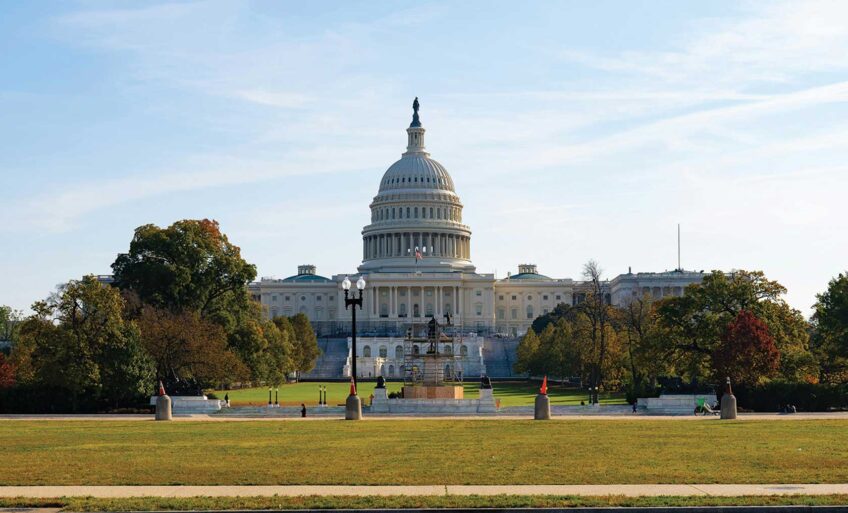When the right to protest disappears, so does your democracy. While egregious examples abound of First Amendment rights being trampled recently, one case from Texas is a harsh reminder of how fragile constitutional rights have become in the U.S.
It began on a quiet Sunday in August 2020, just months after the murder of George Floyd. A few dozen activists in Gainesville, a small town about 70 miles north of Dallas, held an approved, peaceful march calling for the removal of two Confederate statues, one of which is outside the Cooke County courthouse.
On the appointed day, a few dozen protesters walked a 12-block route in about 11 minutes, according to court filings. No one was injured. No property was damaged. Traffic flowed unimpeded. The march had official approval, law enforcement was aware of it and officers were present at the scene. The march began and ended without incident.
Yet despite the Constitution’s guarantee of the right to peaceful assembly, authorities issued arrest warrants for three protest organizers three days after the protest. Even though the organizers had official permission to march, the warrants accused them of “obstructing a highway or other passageway,” a misdemeanor.
The three activists — Torrey Henderson, Justin Thompson, and Amara Ridge of the activist group PRO Gainesville — were tried, convicted, and sentenced to seven days in jail and a $2,000 fine. Their trial unfolded in the same courthouse where one of the Confederate monuments stands.
The “Gainesville 3” have appealed their convictions, and the case is now before an appellate court for review. But the legal threats to the First Amendment right to freely assemble and protest are nationwide.
Courts and Police Push Back
It remains to be seen how the courts will treat thousands of arrests of college students as police crack down on pro-Palestinian protests on college campuses. But recently, the Supreme Court refused to hear the appeal of Deray McKesson — a Black Lives Matter activist being sued by a police officer injured in a protest McKesson organized — experts say it will have wide-ranging impact.
In Gainesville, one of the statues in question was built on the courthouse lawn in the early 20th century, an imposing work that bears inscriptions glorifying the Confederacy. Local historians say the Ku Klux Klan once thrived in this part of the state, according to the Dallas Observer.
Henderson grew up in Gainesville under the shadow of that legacy.
“Being an American has taught me to believe that I have a voice, and that very system has pressed my lips closed,” Henderson said. “I feel like a mission with honest intention of love, equality, and advocacy has portrayed me to be a culprit, tarnished my character, and made me feel unsafe in the space I attended daycare, church, school, work, the grocery store — all for peacefully protesting injustice.”
The constitutionally protected right to protest is a right that is necessary in protecting every single one of us as Americans.
Henderson believes her trial and conviction for a peaceful protest should alarm every American.
“Whether my community — or my nation — agreed with what I had to say, we can all agree that we have the constitutional right to speak for our needs, ask for change, or simply promote democracy,” Henderson says. “The constitutionally protected right to protest is a right that is necessary in protecting every single one of us as Americans.”
In April, the Supreme Court declined to hear McKesson’s appeal after a Baton Rouge, Louisiana, police officer blamed him for violence that erupted during a protest McKesson organized in 2016.
McKesson organized the protest to condemn the police killing of Alton Sterling, an unarmed Black man shot to death in Baton Rouge. During the protest, someone threw a projectile that struck and seriously injured the unnamed officer. While McKesson didn’t throw the object, and the person who did was never caught, the officer sued McKesson, arguing that the protest organizer is responsible for what happened.
A federal court judge agreed with the officer, so McKesson took the years-long battle to the Supreme Court. But the high court’s decision not to hear his case means McKesson — who organized the protest to call attention to an injustice — could be found liable for another protester’s conduct.
Until these cases are resolved, activists using the First Amendment to right societal wrongs face the burden of protecting themselves and their free speech rights.
Thompson, who helped organize the Gainesville protest, said he got involved because he was aware of the local history of racism and the Ku Klux Klan.
“For now, all I can do is pray that the record is set straight about protesters’ rights in Texas and America,” Thompson said.
Shaya Tayefe Mohajer is an award-winning journalist who has worked at Associated Press.






